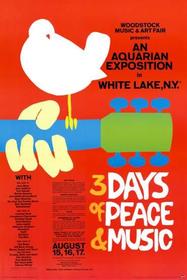 They don't make time machines like they used to; these new self-driving models still have some glitches. For example, last week I traveled back to the 1919 American Booksellers Association Convention, but when I tried to return to present tense I was suddenly rerouted to the convention held 50 years ago. What else could I do? I checked it out.
They don't make time machines like they used to; these new self-driving models still have some glitches. For example, last week I traveled back to the 1919 American Booksellers Association Convention, but when I tried to return to present tense I was suddenly rerouted to the convention held 50 years ago. What else could I do? I checked it out.
Yes, that 1969. You know the high- and low-lights, including the fact that the Woodstock Music and Art Fair would be held in upstate New York just a couple of months after a very different gathering of the clans took place in Washington, D.C.
"Three thousand booksellers, publishers, authors and book critics from several countries were in attendance today as the 69th annual convention of the American Booksellers Association opened in the Shoreham hotel," Robert Cromie wrote in the June 2 edition of the Chicago Tribune, adding that the event "provides a series of seminars, press conferences with authors, and a valuable preview, for the nation's sellers of books, of new titles which will be available for the Christmas trade."
The first day's program featured a reception for the "first-timers" attending, and Dell Publishing hosted a wine-tasting party "at which excerpts were shown from the new Secret of Santa Vittoria motion picture made by Stanley Kramer from Robert Crichton's bestselling book.... The formal program, which is augmented by dozens of receptions and cocktail parties given by publishers to woo booksellers and show off visiting authors, will end Wednesday evening with a dinner dance at which the speaker will be Rod McKuen, musician, composer and poet."
The ABA "tried every trick from the Plant Lady of Television to Marshall McLuhan, but it could not disguise the fact that the soul of its convention at the Shoreham this week is the trade exhibits," the Washington Post reported. "The books world has been described as tweedy and diffident, but the group that circulated through the hall filling shopping bags with assorted giveaways was strictly narrow-lapel and breezy."
Looking for celebrity authors? Tiny Tim (I can’t possibly explain this phenomenon; see video evidence) "did a brief interview and then went right down the hall where all the booths were and spent the day signing autographs. People lined up halfway around the room to see him in the Doubleday exhibit," the Post wrote, adding: "Exhibits relied heavily on closed-circuit TV, slides and other audio-visual aids, including a TV cartoon called Dr. Grosslap, a booth built into an airline counter with uniformed salespeople, latest books listed as 'Arrivals' on the readerboard and a felt banner announcing something called a Bookazine."
Marshall McLuhan, the "prophet of the electronic age" touting his upcoming book, From Cliché to Archetype, was one of the Book and Author Luncheon speakers. The Boston Globe reported that he told his audience "the publishing business is tragically behind in the matter of research into the reading habits of the television generation. He warned them that the printed word is the cornerstone of civilization, its only cause, and that they have a mission to maintain its dominance."
"Children of the television age read best when the page is 4.6 inches away from their eyes, which makes the average book useless to the television child," he observed, adding that the book trade seemed to be doing nothing to understand the situation or to get itself off "the hardware hook" and evaluate the significance of "soft-ware" like Xeroxing.
McLuhan also said "the book is a very special form of communication" that "will persist," but the New York Times noted that his "comments came as a surprise to some listeners.... As author and as lecturer, he is usually associated with new trends in the communications media and as an exponent of television."
"The United States is the only country founded on literacy--on the Gutenberg press," he added. "Therefore, it is having the hardest time adapting to the electronic age."
The chaotic nature of 1969 hadn't quite registered with Rutgers University president Dr. Mason W. Gross, who in a keynote that could have been delivered in 1919, contended that "an obligation to maintain the precision of the English language rests with booksellers and others who distribute books, and he decried a trend toward using words inappropriately and in improper fashion," the Times wrote.
On more contemporary ground was speaker Theodore C. Sorensen, former special counsel to President John F. Kennedy and author of the upcoming book, The Kennedy Legacy. Warning that freedom of expression in the U.S. was under attack, he "said he was concerned 'lest McCarthyism in some new and insidious form return to weaken this country's values,' and charged the book industry with a special obligation to protect the right of free speech," the Times reported.
"Freedom of expression in America--particularly on our college campuses--is under increasing pressure from the New Left and the Old Right.... It will be all too easy for the voices of reason to give way to the voices of Reagan and Marcuse," he argued, noting that a special responsibility to reverse this trend rested with those who sell and publish books "before it spreads to your own profession."
My balky self-driving time machine grudgingly returned to 2019, and now I'm looking toward the more immediate future of BookExpo in New York next week. The distant future? My time machine is still a little skittish about that ("Books? Yes, we have books.").

